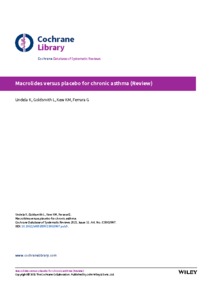Undela, K; Goldsmith, L; Kew, KM; Ferrara, G
(2021)
Macrolides versus placebo for chronic asthma.
Cochrane Database Syst Rev, 11.
CD002997.
ISSN 1469-493X
https://doi.org/10.1002/14651858.CD002997.pub5
SGUL Authors: Goldsmith, Lucy Pollyanna
![[img]](https://openaccess.sgul.ac.uk/113883/1.hassmallThumbnailVersion/Undela_et_al-2021-Cochrane_Database_of_Systematic_Reviews.pdf)  Preview |
|
PDF
Published Version
Available under License ["licenses_description_publisher" not defined].
Download (1MB)
| Preview
|
Abstract
BACKGROUND: Asthma is a chronic disease in which inflammation of the airways causes symptomatic wheezing, coughing and difficult breathing. Macrolides are antibiotics with antimicrobial and anti-inflammatory activities that have been explored for the long-term control of asthma symptoms. OBJECTIVES: To assess the effects of macrolides compared with placebo for managing chronic asthma. SEARCH METHODS: We searched the Cochrane Airways Group Specialised Register up to March 2021. We also manually searched bibliographies of previously published reviews and conference proceedings and contacted study authors. We included records published in any language in the search. SELECTION CRITERIA: We included randomised controlled clinical trials (RCTs) involving both children and adults with asthma treated with macrolides versus placebo for four or more weeks. Primary outcomes were exacerbation requiring hospitalisation, severe exacerbations (exacerbations requiring emergency department (ED) visits or systemic steroids, or both), symptom scales, asthma control questionnaire (ACQ, score from 0 totally controlled, to 6 severely uncontrolled), Asthma Quality of Life Questionnaire (AQLQ, with score from 1 to 7 with higher scores indicating better QoL), rescue medication puffs per day, morning and evening peak expiratory flow (PEF; litres per minutes), forced expiratory volume in one second (FEV1; litres), bronchial hyperresponsiveness, and oral corticosteroid dose. Secondary outcomes were adverse events (including mortality), withdrawal, blood eosinophils, sputum eosinophils, eosinophil cationic protein (ECP) in serum, and ECP in sputum. DATA COLLECTION AND ANALYSIS: Two review authors independently examined all records identified in the searches then reviewed the full text of all potentially relevant articles before extracting data in duplicate from all included studies. As per protocol, we used a fixed-effect model. We conducted a sensitivity analysis for analyses with high heterogeneity (I2 greater than 30%). GRADE was used to assess the certainty of the body of evidence. MAIN RESULTS: Twenty-five studies met the inclusion criteria, randomising 1973 participants to receive macrolide or placebo for at least four weeks. Most of the included studies reported data from adults (mean age 21 to 61 years) with persistent or severe asthma, while four studies included children. All participants were recruited in outpatient settings. Inclusion criteria, interventions and outcomes were highly variable. The evidence suggests macrolides probably deliver a moderately sized reduction in exacerbations requiring hospitalisations compared to placebo (odds ratio (OR) 0.47, 95% confidence interval (CI) 0.20 to 1.12; studies = 2, participants = 529; moderate-certainty evidence). Macrolides probably reduce exacerbations requiring ED visits and/or treatment with systemic steroids (rate ratio (RaR) 0.65, 95% CI 0.53 to 0.80; studies = 4, participants = 640; moderate-certainty evidence). Macrolides may reduce symptoms (as measured on symptom scales) (standardised mean difference (SMD) -0.46, 95% CI -0.81 to -0.11; studies = 4, participants = 136 ; very low-certainty evidence). Macrolides may result in a little improvement in ACQ (SMD -0.17, 95% CI -0.31 to -0.03; studies = 5, participants = 773; low-certainty evidence). Macrolides may have little to no effect on AQLQ (mean difference (MD) 0.24, 95% CI 0.12 to 0.35; studies = 6, participants = 802; very low-certainty evidence). For both the ACQ and the AQLQ the suggested effect of macrolides versus placebo did not reach a minimal clinically important difference (MCID, 0.5 for ACQ and AQLQ) (ACQ: low-certainty evidence; AQLQ: very low-certainty evidence). Due to high heterogeneity (I2 > 30%), we conducted sensitivity analyses on the above results, which reduced the size of the suggested effects by reducing the weighting on the large, high quality studies. Macrolides may result in a small effect compared to placebo in reducing need for rescue medication (MD -0.43 puffs/day, 95% CI -0.81 to -0.04; studies = 4, participants = 314; low-certainty evidence). Macrolides may increase FEV1, but the effect is almost certainly below a level discernible to patients (MD 0.04 L, 95% CI 0 to 0.08; studies = 10, participants = 1046; low-certainty evidence). It was not possible to pool outcomes for non-specific bronchial hyperresponsiveness or lowest tolerated oral corticosteroid dose (in people requiring oral corticosteroids at baseline). There was no evidence of a difference in severe adverse events (including mortality), although less than half of the studies reported the outcome (OR 0.80, 95% CI 0.49 to 1.31; studies = 8, participants = 854; low-certainty evidence). Reporting of specific adverse effects was too inconsistent across studies for a meaningful analysis. AUTHORS' CONCLUSIONS: Existing evidence suggests an effect of macrolides compared with placebo on the rate of exacerbations requiring hospitalisation. Macrolides probably reduce severe exacerbations (requiring ED visit and/or treatment with systemic steroids) and may reduce symptoms. However, we cannot rule out the possibility of other benefits or harms because the evidence is of very low quality due to heterogeneity among patients and interventions, imprecision and reporting biases. The results were mostly driven by a well-designed, well powered RCT, indicating that azithromycin may reduce exacerbation rate and improve symptom scores in severe asthma. The review highlights the need for researchers to report outcomes accurately and according to standard definitions. Macrolides can reduce exacerbation rate in people with severe asthma. Future trials could evaluate if this effect is sustained across all the severe asthma phenotypes, the comparison with newer biological drugs, whether effects persist or wane after treatment cessation and whether effects are associated with infection biomarkers.
Statistics
Item downloaded times since 25 Nov 2021.
Actions (login required)
 |
Edit Item |



